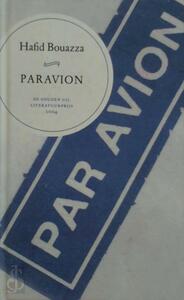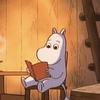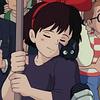Take a photo of a barcode or cover
Zag vaak door de beeldspraakbomen het bos niet meer. Locaties vloeien in elkaar over, en ook van het hoofdpersoon in 3 generaties opa-vader-zoon is soms lastig te weten om wie van de drie het gaat. Wel een interessante kijk op migratie en de ontnuchtering en scheve moraal die daarbij komen kijken
Luister.
Wat klinkt als een aanmaning tot stilte – ssst! – is in werkelijkheid het geluid van de wind in de bomen, een gerucht dat met vele tongen in de bladeren lispelt. En zou dat gekwetter van onzichtbare vogels niet geroddel zijn?
Afgaande op zijn necrologieën moet Hafid Bouazza (1970-2021) een markant figuur zijn geweest, niet in de laatste plaats vanwege zijn alcoholverslaving. De in Marokko geboren schrijver zou tegen wil en dank bekend zijn geworden als vertegenwoordiger van de ‘migrantenliteratuur’ in Nederland.
Paravion is in ieder geval het indrukwekkendste boek dat ik over het onderwerp las. Het begint met een fabelachtige voorstelling van het land Morea – de lezer mag raden – vol magisch-realistische elementen. In samenhang met het verhaal over drie generaties mannen die allen Baba Baloek heten, is de vergelijking met [b:One Hundred Years of Solitude|21032147|One Hundred Years of Solitude|Gabriel García Márquez|https://i.gr-assets.com/images/S/compressed.photo.goodreads.com/books/1586182160l/21032147._SY75_.jpg|3295655] van Gabriel García Márquez snel gemaakt. De vraag is echter of de wereld van Bouazza magisch is of dat zijn personages die zo beleven.
Vanwege de schaarste vertrekken de mannen van Morea naar het beloofde land Paravion (par avion). Aanvankelijk blijft dit oord slechts bij naam genoemd, maar uiteindelijk schuift ook de blik van de schrijver die kant op. Omdat de mannen niet zijn opgewassen tegen de cultuurverschillen, vervallen ze in een zekere conservatieve hooghartigheid. Dat Morea ondertussen ook verandert, maken zij niet mee.
De roman is fragmentarisch: ik had voortdurend de idee dat ik me in een droom bevond en van het ene tafereel naar het andere werd meegenomen. Daarbij blinkt Bouazza uit in het beschrijven van plekken, van de bazaar in Morea tot het park in Paravion. Ik vond zijn stijl sensueel, juist op momenten die dat ogenschijnlijk niet zijn. Personages blijven onderbelicht; de schrijver legt daarentegen nadruk op verschillen – tussen man en vrouw, tussen migrant en autochtoon. Ook provoceert Bouazza veelvuldig en spaart hij zijn personages niet. Zijn kritiek op religie – de schrijver nam zelf afstand van de islam – is in dit boek voelbaar.
Not much going on, except for very lyrical prose. Beautiful, yes, interesting, no.
Een smaakbom van een boek, maar ik heb er niet mee gegeten.
This book is quite disorienting, because you are transported to an exotic world, an African-Arab kind of village in the country Morea, where poverty and sensuality are pervasive, where witches roam, owls have an almost human-like existence and men use flying carpets. There is the call of a distant dreamland where the men of the village are fleeing to. That country is called Paravion, in accordance to the stamp on the letters that arrive from the dreamland (letters that remain unread). There is the story of the shepherd boy Baba Baloek being raised by the witches and the object of endless sexual adventures with the girls who were left behind in the village. And finally there is the story of the sad existence of the migrated men in Paravion itself, which looks suspiciously like Amsterdam.
You could call it ingenious, all these interlacing storylines, but it’s a heavy burden on the reader. Especially because there’s a lot of magic realism and times and places imperceptibly flow into one another; it reminded me a bit of Salman Rushdie, and then obviously Bouazza can not match that model.
But then there’s the language and style: dazzling, shimmering, sensual and exotic, sometimes with wonderful, creative images, but also sometimes too excessive. Bouazza is a great word artist and his creative register is consistent with the magical, exotic atmosphere of his story, but sometimes less is more, and that’s surely lacking in this novel.
Finally, there is the theme of migration, the desire to break out of oppressive relationships, to arrive in a foreign country with a strange culture; settling in is a very hard nut to crack. Bouazza focusses on this theme in the last quarter of the book, when he zooms in on Paravion itself. And he stresses the hypocrisy of the men of Moria on the other moral standards Paravion (both are dealt with with sarcasm). In short, an interesting book, with very beautiful imagery, but a little too chaotic.
You could call it ingenious, all these interlacing storylines, but it’s a heavy burden on the reader. Especially because there’s a lot of magic realism and times and places imperceptibly flow into one another; it reminded me a bit of Salman Rushdie, and then obviously Bouazza can not match that model.
But then there’s the language and style: dazzling, shimmering, sensual and exotic, sometimes with wonderful, creative images, but also sometimes too excessive. Bouazza is a great word artist and his creative register is consistent with the magical, exotic atmosphere of his story, but sometimes less is more, and that’s surely lacking in this novel.
Finally, there is the theme of migration, the desire to break out of oppressive relationships, to arrive in a foreign country with a strange culture; settling in is a very hard nut to crack. Bouazza focusses on this theme in the last quarter of the book, when he zooms in on Paravion itself. And he stresses the hypocrisy of the men of Moria on the other moral standards Paravion (both are dealt with with sarcasm). In short, an interesting book, with very beautiful imagery, but a little too chaotic.
Ik kon niet echt meeleven met de personages. Soms was het verhaal erg vaag.
Hoewel ik Bouazza's enorme woordenschat en lyrische schrijfstijl bewonder, kan ik niet zeggen dat dit een goed boek is. Ik zou verkiezen dit verhaal in een dichtbundel gegoten te zien. Een roman heeft nu eenmaal een plot nodig, en meer dan een naam doorgegeven via generaties is er niet qua rode draad. Teleurstellend aangezien ik had gehoopt inzicht te krijgen in migratie en cultuurverschillen.
challenging
mysterious
reflective
slow-paced
challenging
fast-paced
Plot or Character Driven:
Character
Strong character development:
No
Loveable characters:
No




